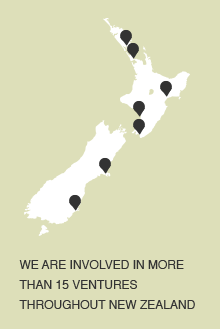Focus areas
- Land & Ecosystems
“New Zealand faces considerable land and water management issues. Sustainable development is part of ‘future proofing’ the unique landscapes and waterways that are a feature of New Zealand, ensuring that we continue to have productive land to farm and beautiful places to explore.”
Source: Landcare Trust
We work with people and organisations who are developing new models that will enhance and incentivise better land management in New Zealand. We are also working with groups who are developing market mechanisms that will reward stewardship, create livelihoods and regenerate our land and waterways.
- Consumption & Waste
“The world’s population uses the equivalent of 1.5 planets to provide the resources we use and absorb our waste. This means it now takes the Earth one year and six months to regenerate what we use in a year. Moderate UN scenarios suggest that if current population and consumption trends continue, by the 2030s we will need the equivalent of two Earths to support us. And of course, we only have one.”
Source: Global Footprint Network
We work with people and groups that are breaking new ground and revolutionising approaches to the way we consume. By repurposing valuable materials, creating employment opportunities and connecting businesses and individuals with shared values, the people we support are aiming to turn our attitudes to consumption and waste around.
- Transport
“Transportation is responsible for one-third of all greenhouse gas emissions in developed nations and is the fastest-growing source of greenhouse gas emissions in developing countries.”
Source: WRI Insights
We work with people and organisations who are developing low-carbon and smarter public transport options that meet the needs of New Zealand’s dispersed population and are helping New Zealanders to think differently about how they move around.
- Housing
“On average, New Zealand homes are 6°C below World Health Organisation recommended minimum temperatures.
Cold homes create condensation - 45 percent of our homes have mould and are ideal environments for fungi and dust mites - helping to trigger increasingly high rates of allergy and asthma. This contributes to New Zealand’s high winter mortality rate (1,600 more people die in winter than in summer) - one of the highest in the developed world.”
Source: Beacon
We’re working with people who are developing smart ways to improve our housing stock by combating energy inefficiency and sharing their knowledge with industry and training institutes.
- Energy
“Continued reliance on outdated energy sources, coupled with a growing population and the emergence of a global middle class, put the world on a pathway to experience climate impacts of a dangerous and irreversible magnitude. This fossil fuel-based growth trajectory of the last century is no longer sustainable or economically viable.”
Source: World Resources Institute
We’re working with communities, organisations and individuals who are rethinking their approach to energy and coming up with new, bold ways of generating energy supply and challenging fuel poverty in New Zealand. We’re aiming to mitigate carbon emissions, enable new models of community development, increase energy literacy and facilitate the next generation’s distributed energy system.
